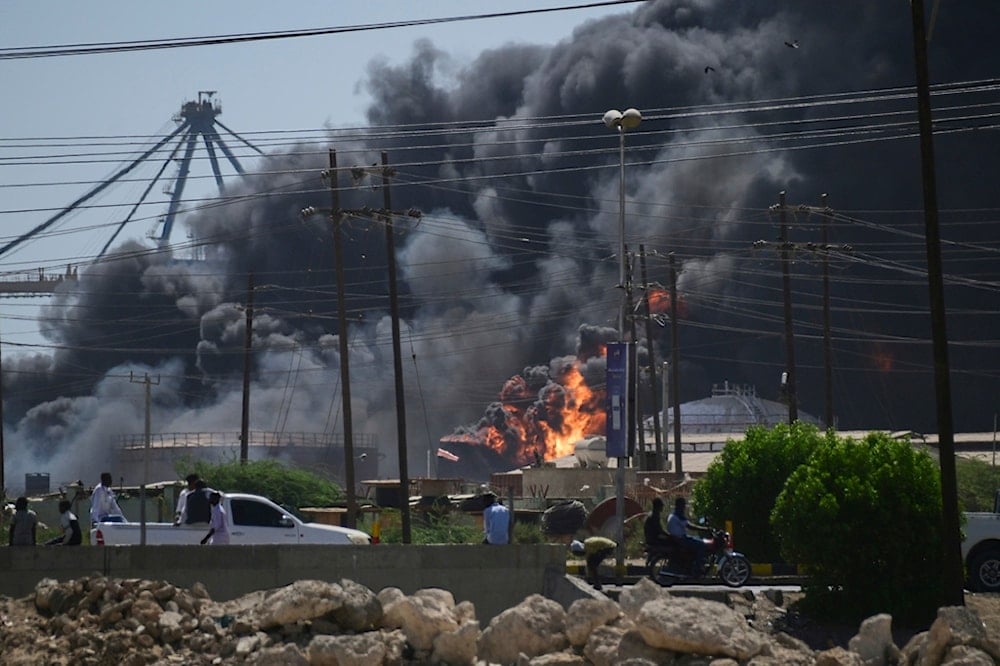Sudan urges UNSC to investigate 'genocide' in Darfur's El Fasher
Sudan’s envoy to the UN has urged the Security Council to investigate what he described as genocide in El-Fasher, where the RSF is accused of killing hundreds.
-

Smoke billows after drone strikes by the paramilitary Rapid Support Forces (RSF) targeted the northern port in the Red Sea city of Port Sudan, Sudan, Tuesday, May 6, 2025 (AP)
Sudan’s Permanent Representative to the United Nations, Al-Harith Idriss al-Harith Mohamed, has called on the UN Security Council (UNSC) to launch an official investigation into the “genocide” in El Fasher, the capital of North Darfur.
“We call on the council to launch an investigation into the genocide of the inhabitants of El Fasher city to advance accountability,” al-Harith Mohamed told the UNSC during a session on Sudan. “The militia issues daily threats of mass murder,” he added, referring to the Rapid Support Forces (RSF).
The United Nations Security Council on Thursday had condemned what it described as atrocities committed by Sudan’s Rapid Support Forces (RSF) in El-Fasher, the last army stronghold in Darfur, which fell to the paramilitary group after an 18-month siege.
In an emergency session, Council members denounced the RSF assault and its “devastating impact on the civilian population,” citing reports of summary executions, arbitrary detentions, and ethnically motivated violence. The statement recalled an earlier resolution demanding that the RSF lift its siege and warned of a “heightened risk of large-scale atrocities.”
El-Fasher’s capture marks a significant escalation in Sudan’s civil war and has triggered a wave of displacement across western Sudan. Aid organizations operating in nearby Tawila, roughly 70 kilometers from the city, described an alarming humanitarian situation as thousands flee the violence.
“The situation has taken a dramatic turn since Sunday,” said John Ocheibi of the NGO ALIMA, speaking to AFP from the group’s clinic in southern Tawila. “Women and children are arriving in extremely bad shape; many haven’t eaten for days, others were beaten or threatened along the way.”
Local volunteer networks, including the Emergency Response Room in Tawila, appealed to the UN to move swiftly to assist displaced families, warning that the region faces a “serious humanitarian situation” as new waves of civilians pour in.
RSF commander Mohammad Hamdan Daglo on Wednesday issued a rare apology “to the inhabitants of El-Fasher for the disaster that has befallen them,” pledging to investigate reports of atrocities which his group was accused of committing.
Sudanese army chief Abdel Fattah al-Burhan vowed on Monday that government forces would continue fighting “until we purify this land.”
Activists in El-Fasher reported that sporadic gunfire continued late Wednesday in the city’s western districts, where small pockets of army resistance remain.
Humanitarian agencies warn that without immediate intervention, the fall of El-Fasher could mark the beginning of a wider humanitarian disaster across Darfur.
Humanitarian crisis in El Fasher escalates
Violence in El Fasher has intensified over the past weeks, forcing an estimated 28,000 people to flee, according to the World Health Organization. The UN anticipates that another 100,000 civilians will be displaced to the neighboring area of Tawila in the coming days and weeks.
The Rapid Support Forces (RSF) have been accused by the Sudanese Doctors' Union of committing mass atrocities and acts of ethnic cleansing in El Fasher, the capital of North Darfur, after seizing control of the city over the weekend. Humanitarian organizations and local medical sources report that over 177,000 civilians remain trapped amid widespread killings, abuse, and the collapse of basic services.
According to the statement, around 2,000 civilians were killed within hours of the RSF’s entry into the city. Victims were reportedly burned alive, and many of the 177,000 civilians still in El Fasher are feared to have been subjected to similar atrocities.
The statement also detailed a massacre at the Saudi hospital in El Fasher, where RSF forces were said to have executed more than 450 patients and wounded individuals, alongside approximately 1,200 elderly, sick, and injured people in surrounding field medical facilities.
WHO condemns atrocities
The WHO confirmed the estimates and condemned the killings of at least 460 civilians, as well as the abduction of six health workers from the Saudi Maternity Hospital, as a grave violation of international humanitarian law.
According to the WHO, the latest escalation in Darfur underscores the urgent need for international monitoring and intervention. Human rights groups and aid organizations have echoed calls for the UN Security Council to investigate reported war crimes and ensure humanitarian access to affected regions.
As of now, the UNSC has not announced any formal probe into the atrocities in El Fasher, but has condemned the RSF's aggression.
Read more: UAE directly funded RSF, leading to fall of El-Fasher: Sudan

 5 Min Read
5 Min Read










